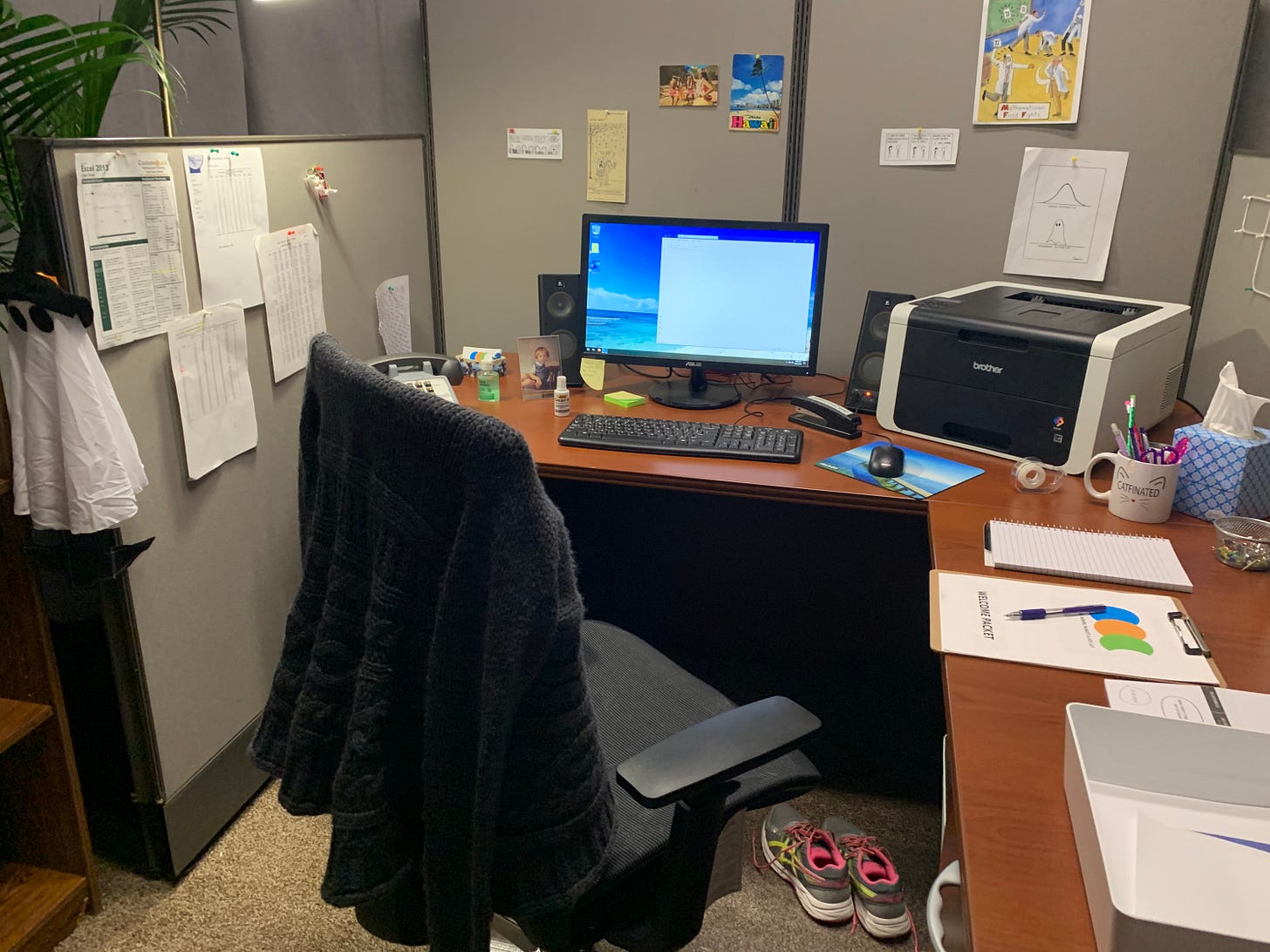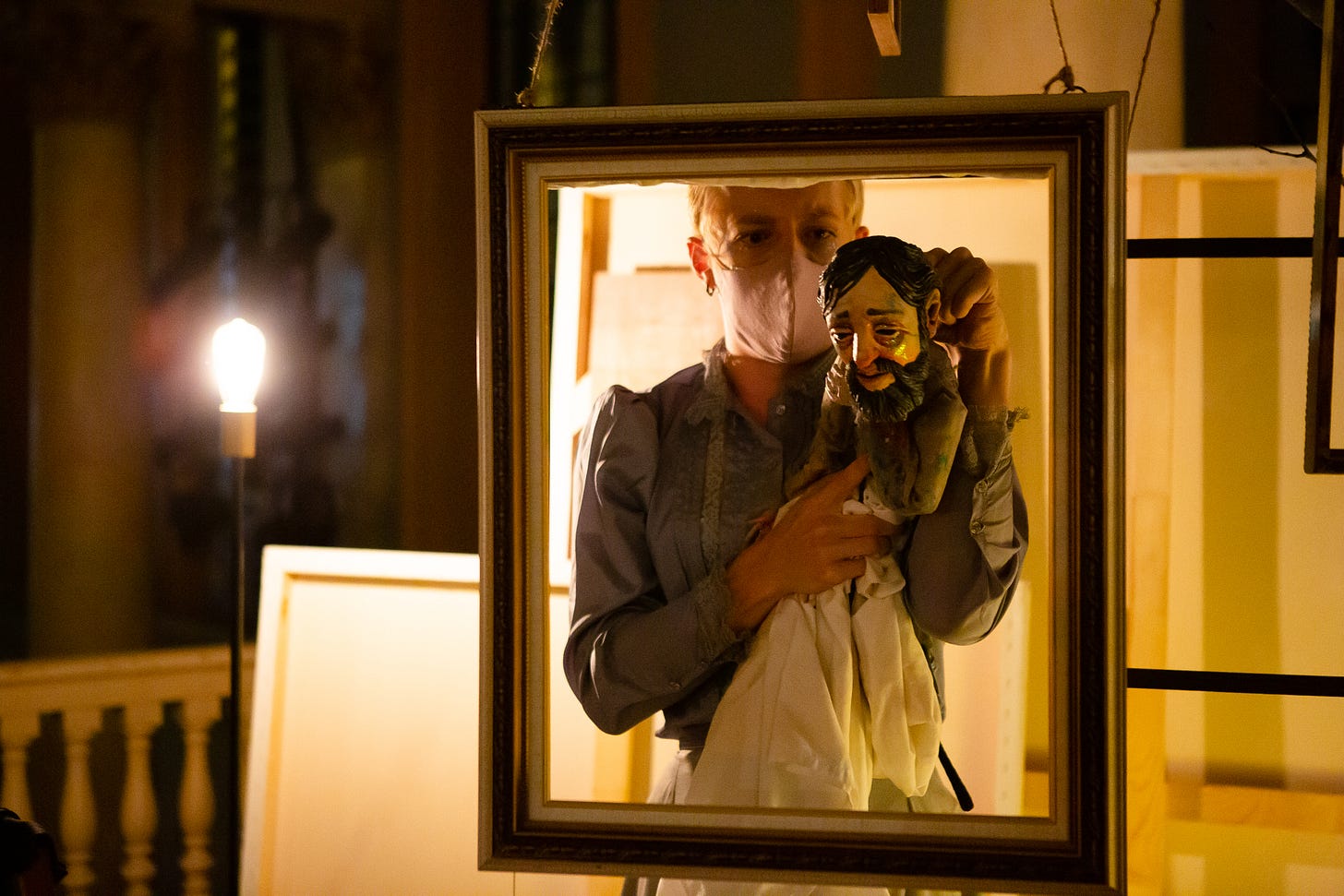Round up: Theater that’s making it work
Four shows - two outdoor, one indoor, one virtual - hammer out new forms
Temping

Temping (photo: Max Ruby)
According to this show, I will die at the age of 77.
Temping puts you to work. An office cubicle now occupies the Wild Project lobby. Seasoned actuary Sarah Jane Tully has taken her first vacation in years, and you are the temp. No actors are involved - in fact, you won’t interact with humans at all outside of video, phone and e-mail. Mostly e-mail. As soon as you sit down at your desk, they start pouring in.
I worked a fairly stressful office job prior to the pandemic. Temping opens with a frenzy of emails, voicemails and demands which brought me right back. Then the pace of the work gradually slows, allowing a few quiet moments to yourself. Given a moment to reflect, I started to wonder: Why am I doing this? What is the point? Why not refuse, and see what happens? But then another e-mail popped up, and I was back to it, existential crisis be damned. So, just a regular day at the office.
Well, not so regular. As Temping progresses, some strange stuff starts happening. Your printer keeps spitting out emotional, all-caps messages: “I MISS U,” “TALK TO ME!!! PLEASE DON’T GO TO HR.” You’re invited to enter your own age into a formula for estimating lifespan, as mentioned (77 seems aspirational at this point). And any time you update an individual’s status to “Deceased” on one particular excel doc, the space shifts dramatically and something very moving happens. I won’t spoil it.
A day at the office always edges close to existential crisis. The trick is to just not think about your life too much. So of course, Michael Yates Crowley’s expert script pushes you to consider the value of each and every life, even as you keep updating cells and shooting off e-mails. Michael Rau’s direction, precise if barely perceptible, creates an unearthly vibe that gets you to Crowley’s level. It’s kind of a cruel piece.
Don’t get me wrong, Temping is a good show. I just don’t think I would have returned to that job for a second day. It was too much. Or maybe I’ve forgotten about what was normal.
Cory and Smin’s Love Conquers the Earth

Daphne Overbeck & Jamie Lowenstein Cory and Smin’s Love Conquers the Earth (photo: Derick Whitson)
In a back garden in Williamsburg, chiptune pre-show music was giving me everything I needed. I may have reached out to Cory and Smin’s author, Billy McEntee, directly afterwards and insisted he send me the full playlist. (Full disclosure - McEntee edited my work in The Brooklyn Rail for their September issue.) All plays should start with pre-show chiptune, in my view. It should be a rule.
Billed as an “eco-medy,” Cory and Smin follows the long-distance romance between two teens living on opposite coasts. As Smin explains to our narrator and guide, a maternal being called Lime Rickey, they met on a chatroom “for Queer-and Environmentally Distressed-Identifying Over-Achieving Seniors Who Are Always Cast in Bit Roles in Their High-School Musicals.” That line is characteristic of McEntee’s witty, effusive dialogue.
Cory and Smin’s love hits a roadblock when Smin refuses to fly cross-country to meet in-person, citing the carbon footprint of the flight. “I’ve been thinking about the ecological impact of our love,” they tell a devastated Cory. More and more, their distanced relationship hits up against the overwhelming burden of the environmental disaster Gen-Zers see before them - a disaster which it feels they must confront alone.
It has become rote to declare that a pre-pandemic play “feels written for these times.” But yes, that is true of Cory and Smin. McEntee is especially precise on the pain, and at times desperation, of building intimacy online. The bigger accomplishment is tackling our supremely fucked future with a light touch, a joyful wit, and a comforting big-heartedness. Assisted perfectly by Charles Quittner’s warm, colorful production, McEntee hits that balance just right. He’s not saying we’ll be fine, or promising a brighter future ahead - who can say? Cory and Smin tells the truth, but it ties the joy and pain all into one.
The Seagull on The Sims 4

As virtual theater pieces keep evolving, theaters may have to work on building expectations around them properly. Not an easy task in the case of The Seagull on The Sims 4, created and performed by Celine Song and streamed live on Twitch Oct 27-28th. As it turned out, the re-creation of the play was the least important, and least interesting, element of what Song was up to here.
The thrill of the piece instead lay in watching an artist’s creative process play out in real time. Song narrated the audience through each decision in creating her Sims - hair, clothes, gait. Sometimes she consulted the chat for opinions. The chat, filled with friends, fans and theater nerds, happily yelled back opinions and advice.
Then, once the ‘play’ began, Song invited friends to call in and talk with her. Guests included Jeremy O. Harris and actress/playwright Jiehae Park. While a Sims approximation of The Seagull continued in the background, they’d discuss their relationship to Chekhov, how Song’s show was going, or really whatever was on their mind.
One highlight: Song played a recording of Trigorin’s monologue about the miserable daze of the writer’s life, performed by Endlings’ Emily Kuroda, as her Trigorin Sim sat sad and lonely in an empty kitchen. For a moment, audio play collided with theater, collided with video game, collided with live streaming. It was, genuinely, like nothing I’d seen before.
I dipped in and out on both nights, my mind straying to other tasks. Maybe that’s fine. Or even encouraged. Song herself asked Park, as they chatted, if it was really engaging to just watch her have fun. “It’s so fun to watch you have fun,” Park argued. “That’s actually a profound thing….it’s joyful for other people to see you have joy.” Of course artists should not always assume that if they are having fun, then therefore this is fun to watch. But in this case, yep, worked just fine.
Voyeur

Ryan Lisa, with puppet by James Ortiz, in Voyeur (photo: Hunter Canning)
Voyeur starts out as chaos. The first ‘stop’ on this outdoor play, a guided immersive journey through the streets of the Greenwich Village, is a bawdy song-and-dance display in the windows above The Duplex. At my evening performance, passers-by gathered around quickly. Kids selling candy joined our group. Two men gleefully took pictures of the women in the windows, seemingly oblivious to how skeevy this was. I wondered how the show could possibly remain controlled as we continued through New York streets on a beautiful night.
I needn’t have worried. As Voyeur continues, it settles down. The hangers-on fall away (mostly). The show’s performers took control, drawing us into fragments of Henri de Toulouse-Lautrec’s troubled life.
Voyeur really finds its feet at the halfway point, in a stunning tableau depicting Toulouse-Lautrec’s mother encased in an enormous dress, struggling to help her son - in puppet form - as his legs suffer fractures. The Toulouse-Lautrec puppets (created by James Ortiz) are stunning creations. Empathy for the damaged artist shines through in their design, as well as the careful operation (by Persephone Squires, Jordon Walters and Ryan Lisa).
Even Voyeur’s boldest move ends up working: walking the audience directly through Washington Square Park. This should have been folly. But on my night, we walked past two peculiarly dressed figures we were shocked to discover were NOT cast members; then, right through an entirely unrelated outdoor show, performing what looked like acrobatic circus tricks.
As my crowd tried to decipher which bizarre sights were part of our show, and which were just images from a standard West Village night, this whole affair started to feel very appropriate. I guess soon, New York will become just a collage of outdoor immersive shows, one on top of the other, until telling fantasy from reality proves impossible.



